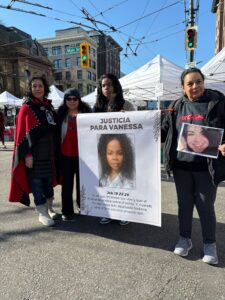
Today, the IIO has published its findings into the fatal police shooting of Vanessa Rentería in Surrey, BC. As an anti-violence and mental health advocate organization, we issue the following response:
This report highlights the narrow focus of the Independent Investigations Office in BC. It treats Vanessa’s pain as pathology rather than as the predictable outcome of violence, marginalization, and systemic neglect.
First, to the extent that mental distress was present, it was inseparable from a deeper crisis of genderbased violence and housing insecurity. Vanessa was a newcomer, a mother, and someone who had already sought refuge from an abusive environment. BWSS has documented that her history of leaving a home with abuse and her status as a Spanish speaker in a city with inadequate interpretation built structural risk into her encounter with RCMP. There is evidence that she left the transition house she was staying due to the house being defunded by the province of British Columbia and she eventually returned to a place she had previously fled.

Sandra (Vanessa’s sister) at the 34th Annual February 14th Women’s Memorial March Downtown Eastside Vancouver honouring all missing and murdered women, girls and 2S.
Second, the report confirms that core pillars of safe crisis response were absent: There was no meaningful risk assessment, no linguistically competent intervention, and no trauma-informed de-escalation. By ignoring these, the system failed her before armed officers even arrived.
Third, rather than calming the moment, policing escalated it. Armed formations, repeated shouted commands, and a tactical posture turned vulnerability into justification for force, rather than offering genuine sanctuary.
Fourth, the fact that the Subject Officer declined to give a statement is deeply troubling. It underscores the structural impunity built into policing and oversight: the one person who could directly explain why the shots were fired remained silent, while the final narrative privileges police perceptions over community voices and
lived context.
Fifth, the IIO’s framing reinforces the police story instead of interrogating it. Rather than exposing structural failure — the absence of translation, risk tools, trauma-informed teams, or alternative crisis pathways — the report treats lethal force as the inevitable resolution. That is not accountability.
Sixth, Language access is a matter of life and death. Vanessa was a Spanish-speaking woman in crisis, yet no Spanish-speaking officers were deployed. Instead, RCMP relied on Google Translate, a free app, to communicate in a moment where every word mattered. Vanessa didn’t need Google Translate; she needed safety. That the RCMP relied on a free app in a life-or death crisis shows how little value is placed on the lives of immigrant women.

Sandra (Vanessa’s sister) speaking to media
The RCMP treated Google Translate like a life-saving intervention. It isn’t, it is an app and relying on it in a moment like this speaks volumes about systemic disregard for Immigrant women’s lives.
Machine translation cannot provide nuance, reassurance, or trust. It cannot replace the role of a qualified interpreter, let alone the culturally informed care that should have been deployed. Miscommunication through the app even produced the most explosive claim of the night that Vanessa said she would harm her baby, a claim later walked back by witnesses. That single mistranslated moment may have escalated the encounter toward her death.
Using Google Translate in a crisis is not a neutral act. It is systemic negligence. It reflects an institution that is comfortable improvising with women’s lives rather than investing in basic, life-saving language access.
Finally, the outcome, a child left without her mother, was not an act of fate, it was preventable. It is a stark example of state-inflicted femicide, when survivors of violence are met not with protection but with bullets.
Vanessa’s death demands more than condolences or procedural reform. It demands a reckoning with how policing, accountability, transparency, oversight, and crisis systems fail survivors. We stand united with her sister, friends and family in Colombia, with her child, and with all those suffering in invisible crisis. The public deserves nothing less than accountability, honesty, transparency, and justice.




